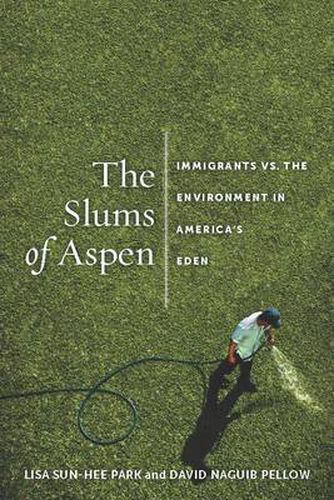Readings Newsletter
Become a Readings Member to make your shopping experience even easier.
Sign in or sign up for free!
You’re not far away from qualifying for FREE standard shipping within Australia
You’ve qualified for FREE standard shipping within Australia
The cart is loading…






Environmentalism usually calls to mind images of peace and serenity, a oneness with nature, and a shared sense of responsibility. But one town in Colorado, under the guise of environmental protection, passed a resolution limiting immigration, bolstering the privilege of the wealthy and scapegoating Latin American newcomers for the area’s current and future ecological problems. This might have escaped attention, save for the fact that this wasn’t some rinky-dink backwater. It was Aspen, Colorado, playground of the rich and famous and the West’s most elite ski town. Tracking the lives of immigrant laborers through several years of exhaustive fieldwork and archival digging, The Slums of Aspen tells a story that brings together some of the most pressing social problems of the day: environmental crises, immigration, and social inequality. Lisa Sun-Hee Park and David Naguib Pellow demonstrate how these issues are intertwined in the everyday experiences of people who work and live in this wealthy tourist community. Developing the idea of environmental privilege othe economic, political, and cultural power that some groups enjoy, which enables them exclusive access to coveted environmental amenities such as forests, parks, mountains, rivers, coastal property, open lands, and elite neighborhoodsothey argue that this odd marriage of environmental and nativist groups occurs because of population fearsoboth want fewer people, especially if they are the brown sort. They situate Aspen, along with all of Colorado’s Roaring Fork Valley, as a microcosm of a toxic convergence of immigration and environmental politics in the American West. Offering a new understanding of a little known class of the superelite, of low-wage immigrants (mostly from Latin America) who have become the foundation for service and leisure work in this famous resort, and of the recent history of the ski industry, Park and Pellow expose the ways in which Colorado boosters have reshaped the landscape and altered ecosystems in the pursuit of profit and pleasure. Of even greater urgency, they frame how environmental degradation and immigration reform have become inextricably linked in many regions of the American West, a dynamic that interferes with the efforts of valorous environmental causes, often turning away from conservation and towards insidious racial privilege.
$9.00 standard shipping within Australia
FREE standard shipping within Australia for orders over $100.00
Express & International shipping calculated at checkout
Environmentalism usually calls to mind images of peace and serenity, a oneness with nature, and a shared sense of responsibility. But one town in Colorado, under the guise of environmental protection, passed a resolution limiting immigration, bolstering the privilege of the wealthy and scapegoating Latin American newcomers for the area’s current and future ecological problems. This might have escaped attention, save for the fact that this wasn’t some rinky-dink backwater. It was Aspen, Colorado, playground of the rich and famous and the West’s most elite ski town. Tracking the lives of immigrant laborers through several years of exhaustive fieldwork and archival digging, The Slums of Aspen tells a story that brings together some of the most pressing social problems of the day: environmental crises, immigration, and social inequality. Lisa Sun-Hee Park and David Naguib Pellow demonstrate how these issues are intertwined in the everyday experiences of people who work and live in this wealthy tourist community. Developing the idea of environmental privilege othe economic, political, and cultural power that some groups enjoy, which enables them exclusive access to coveted environmental amenities such as forests, parks, mountains, rivers, coastal property, open lands, and elite neighborhoodsothey argue that this odd marriage of environmental and nativist groups occurs because of population fearsoboth want fewer people, especially if they are the brown sort. They situate Aspen, along with all of Colorado’s Roaring Fork Valley, as a microcosm of a toxic convergence of immigration and environmental politics in the American West. Offering a new understanding of a little known class of the superelite, of low-wage immigrants (mostly from Latin America) who have become the foundation for service and leisure work in this famous resort, and of the recent history of the ski industry, Park and Pellow expose the ways in which Colorado boosters have reshaped the landscape and altered ecosystems in the pursuit of profit and pleasure. Of even greater urgency, they frame how environmental degradation and immigration reform have become inextricably linked in many regions of the American West, a dynamic that interferes with the efforts of valorous environmental causes, often turning away from conservation and towards insidious racial privilege.